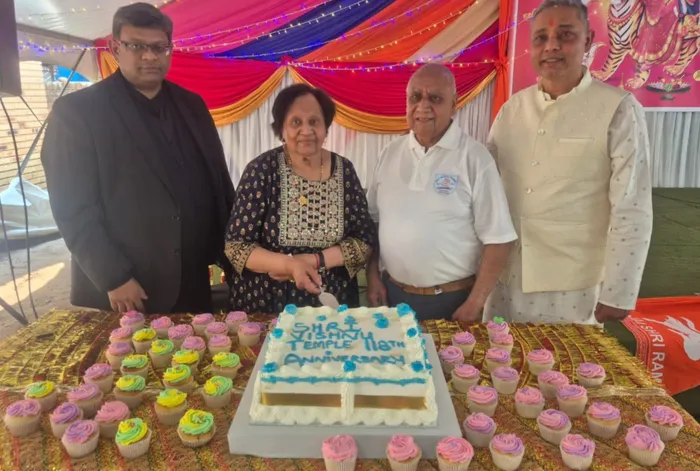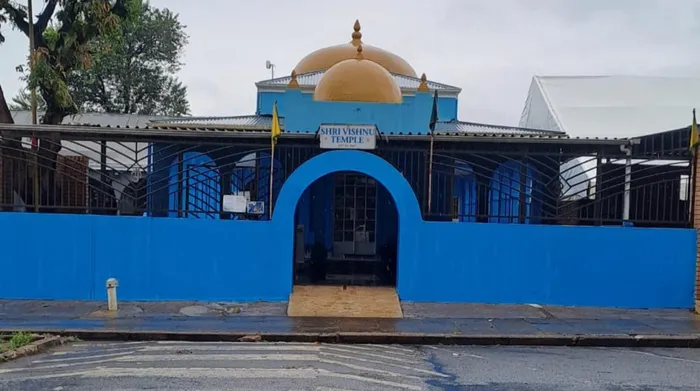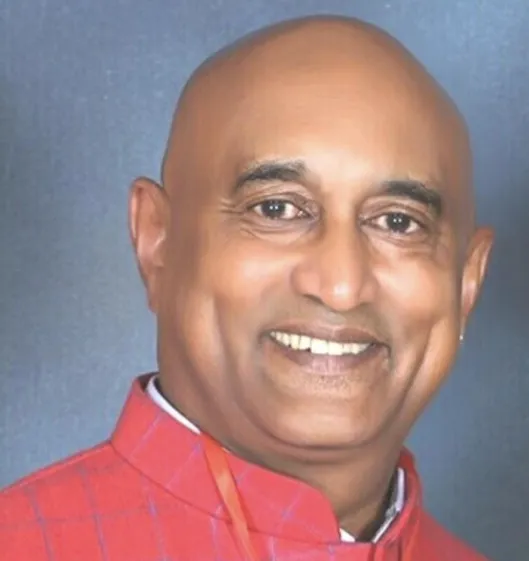
Advocate Ranjiv Nirghin, left, President of the South African Hindu Maha Sabha, Savithree Maharaj, Bob Teeluck,and Kapil Singh, Chairperson of the Shree Vishnu Temple, at the 118 year anniversary celebrations.
Image: Supplied
THE 118th anniversary celebration of the Shri Vishnu Temple in Pietermaritzburg on Sunday was not only a joyous religious gathering but also a profound reminder of how sacred spaces anchor communities, safeguard traditions, and keep alive the vision of our forefathers.
On Sunday, October 13, 1907, just 47 years after the first indentured labourers from India set foot in Natal, a devoted group of Hindus formed the Shri Vishnu Temple committee. Their mission was clear: to meet the growing spiritual needs of their community and to create a sanctuary where their faith and traditions could thrive in a foreign land.
By November of that year, land was purchased on Langalibalele Street (then Longmarket Street), opposite the Sri Siva Soobramoniar and Mariammen temples. The Shri Vishnu Temple was completed in 1922, and in 1924, marble deities of Vishnu, Lakshmi, Krishna, and Rama, imported from India, were consecrated. The temple’s architecture remains a fine example of the simple north Indian style - a central dome with a shrine room surrounded by a veranda, enabling devotees to circumambulate in prayer.
Over the years, the temple expanded. A school was established in 1924 to teach the Hindi language, ensuring that the children of the community remained connected to their linguistic and cultural roots. By 1952, a formal primary school was opened on adjoining land, with extensions added in 1965. In 1988, the Shri Vishnu Temple was declared a National Monument, cementing its status as a landmark of both faith and heritage.

The Shri Vishnu Temple in Pietermaritzburg.
Image: Supplied
The survival and flourishing of the Shri Vishnu Temple for more than a century speaks volumes about the resilience of our community. Our forefathers arrived with little material wealth, but they brought with them priceless treasures - their religion, their culture, and their languages. These formed the bedrock of identity, strength, and resilience in the face of great adversity. Today, as we commemorate 118 years, it is clear that the temple committee and leadership continue to honour this legacy. Their efforts to preserve rituals, host festivals, and sustain cultural education echo the vision of those who laid the foundation stones more than a century ago.
Religion is not static; it is a living force that evolves with time while staying rooted in eternal truths. The Shri Vishnu Temple has stood as a beacon for the Hindu community in Pietermaritzburg and beyond - not just a place of worship but a cradle of education, language, and cultural expression. In a rapidly globalising world, where traditions often risk being diluted or forgotten, the preservation of religious practices becomes all the more urgent.
Temples like Shri Vishnu ensure that rituals, languages, and values are not lost but transmitted from one generation to the next. For the youth especially, such spaces serve as reminders of identity and as reservoirs of moral and spiritual strength.
While rooted in the Indian community, the significance of the Shri Vishnu Temple extends beyond ethnicity or religion. In a diverse nation like South Africa, religious and cultural institutions play a crucial role in promoting social cohesion. By opening doors to dialogue and celebrating diversity, temples become bridges of understanding among communities.
As South Africans, we must recognise that the preservation of heritage does not stand in opposition to patriotism. Rather, it strengthens our national fabric. The more we nurture and share our unique traditions, the more we enrich the collective identity of our beloved country.
The 118-year journey of the Shri Vishnu Temple is more than a history of bricks and mortar; it is a history of faith, sacrifice, and vision. It is a living monument to the determination of those who came before us and a reminder of the responsibility we bear today. To the temple committee and leadership, your commitment to safeguarding this legacy is commendable. To the community, especially the youth, I say: cherish this inheritance, for it is not only your history but also your future.
May the Shri Vishnu Temple continue to shine as a source of inspiration, devotion, and unity for generations to come.

Dr Rajendran Govender
Image: File
Dr Rajendran Govender is a commissioner in the Cultural, Religious and Linguistic Rights Commission; board member of the Pan South African Language Board; social anthropologist and researcher and CEO of the Tamil Business Warriors.
Related Topics: